Pro patria mori. Now there’s the test for Henry V - perform it on Remembrance Day. The “band of brothers” shtick relies on an idea of patriotism from an age when there was no need to define something so heartfelt, and an idea that kings and commoners were all in it together when fighting the enemy. After all, Henry orders the good English soldiers to rape French girls, smash the heads of French grandfathers, and skewer their babies on pikes, no questions asked. The bonuses of patriotism, if you like.
But Royal Shakespeare Company artistic director Gregory Doran presents a handwringing, post-Blair Henry V. Alex Hassell’s newly crowned King Hal has the startled defensiveness of an X-Factor contestant thrust into the spotlight pleading nerves as he delivers his prescribed song. This “star of England” hunches his head down into his shoulders as if expecting brickbats, he scuttles quickly off stage each time as if escaping followers rather than leading them. For all Hassell’s natural good looks, it is a puzzlingly uncharismatic, personality-free performance, and I could not and still cannot make out what this approach is supposed to say about the mysterious charisma that certain leaders can summon up to cast a spell on men and make them follow tribal emotions into unsensible wars.
There is not much private emotional interior to this King Harry, no sense of the imagery he's been endowed with by the public, none of the sorts of sophisticated deceptions and pretences unique to royal princes in unregulated times which made - let’s say - Charles Edwards’ recent Richard II at the Globe such a provocatively interesting king (Richard, of course, was conquered by Henry V’s dad only 15 years previously). Hassell’s Harry discloses his unkingly fears and ordinary inadequacies, by flinching body language when it’s not to be found in the words.
Take a “patriotic” play, act it contrary to its suggestions, and this should be enough to optimise it for a sceptical new England
I infer that this inverting of leadership qualities is Doran’s intention. It’s not in the text so a countering text is thrust into the metadata - take a “patriotic” play, act and play it contrary to its suggestions, and this should be enough to optimise it for a sceptical new England that once again quakes about its borders, and sends out its nationalist stereotypes onto the public stages.
But the mix of “now” and “then” is inconsistently updated, draining the evening of mythic power and not substituting it with satirical presence. Oliver Ford-Davies's Chorus is from "now", a cosy, retired-academic type in brown corduroys and cardigan, who keeps us in the loop with narrative links to the historic action from a bleak steel stage hung with metal bead curtains and sliding back walls by Stephen Brimson Lewis.
It’s the setting that is much the most interesting factor in Doran’s production. Evoking the backend of an old newspaper printing house or a TV studio, its screens and frames wait for messages, a canvas for lighting designer Tim Mitchell’s wonderfully suggestive transformations in outdoor atmospheres and colour (storms, explosions, woods), though much less effective for indoor episodes, when a couple of heraldic trumpeters do duty announcing scene changes and the lack of location is severely felt.
Yet the resonances of the set don’t seem thought-through. Fair enough, we the audience are implied as Henry’s audience, his supportive public - or indeed a hostile public. Henry stands virtually alone to address his bloodcurdling threats to us, as the “men of Harfleur”, yet I didn't believe Hassell's acting for a second. He delivers his Crispin’s Day speech to just 10 soldiers on the stage, but once again the actor’s body language and tentative delivery overemphasises doubt and underplays a sense of feeling the hand of history on his shoulder, never suggesting that he has learned, by observing his men, how to speak to a nation and lead their hearts and minds.
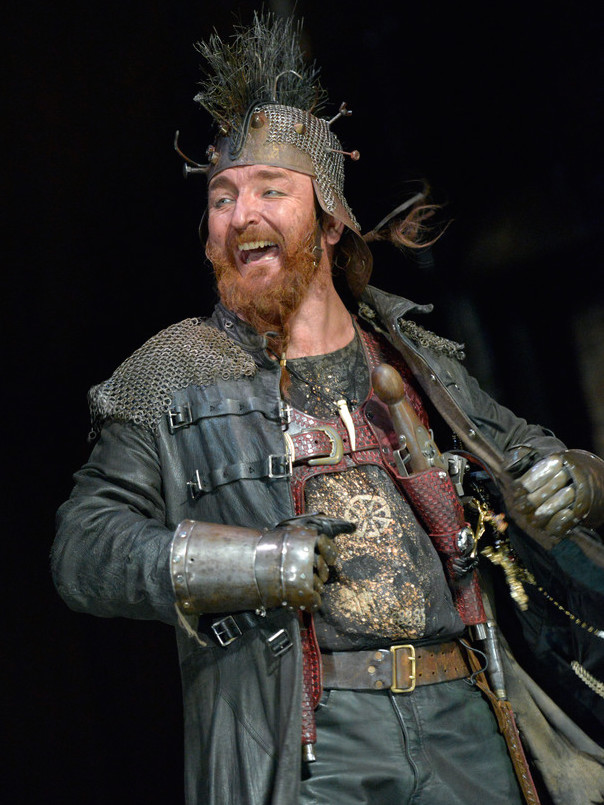 The “brothers” themselves have been dressed up (by Brimson Lewis, I assume) as the fat hairy biker types pickled in TV comedy - windbag Welshman, incomprehensible Scotsman, away-with-the-fairies Irishman, bluff Englishman (right, Antony Byrne as Pistol) - who with their raddled clothes and dreadful overgrown hair and beards are only missing the Harleys. Their anachronistic pretend-medieval appearance inside the metallic presentation box set enhances the sense of them as joke figures, rather than representative of the British people. But they do get a lot of laughs from the audience, as does the Blackadder-ish comedy playing of Princess Katherine’s English lesson and Robert Gilbert’s camp Dauphin.
The “brothers” themselves have been dressed up (by Brimson Lewis, I assume) as the fat hairy biker types pickled in TV comedy - windbag Welshman, incomprehensible Scotsman, away-with-the-fairies Irishman, bluff Englishman (right, Antony Byrne as Pistol) - who with their raddled clothes and dreadful overgrown hair and beards are only missing the Harleys. Their anachronistic pretend-medieval appearance inside the metallic presentation box set enhances the sense of them as joke figures, rather than representative of the British people. But they do get a lot of laughs from the audience, as does the Blackadder-ish comedy playing of Princess Katherine’s English lesson and Robert Gilbert’s camp Dauphin.
So it all gets the audience tittering, but it offers nothing to engage us with the difficult issues in the text, given the significant extra obstacle of much poor speaking. Most of the actors go at an unthinking gallop, and several simply don’t have adequate articulation and projection skills, which may explain a general lack of security in characterisation.
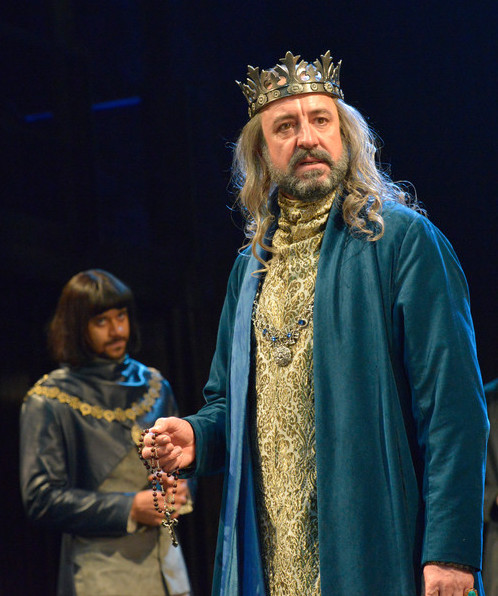 Keith Osborn’s Mountjoy and Simon Thorp’s King of France (pictured left with Robert Gilbert as the Dauphin) manage to break step with more measured delivery, and thus more authority.
Keith Osborn’s Mountjoy and Simon Thorp’s King of France (pictured left with Robert Gilbert as the Dauphin) manage to break step with more measured delivery, and thus more authority.
It must be said that the Barbican Theatre’s wayward acoustic is a problem. A few strides downstage make a quantum leap in audibility, particularly afflicting Jane Lapotaire’s cameo appearance as the French Queen Isobel. Her role is much enriched from the text’s blink-and-miss-her role by taking over Burgundy’s final plea for peace, and Lapotaire strikes a welcome note of urgent seriousness, but I’d have thought some directorial reassessment of the hall’s acoustic is demanded for her sake at least.
Flat, charmless, skating over tough things - Doran's production is the puniest Shakespeare I've seen for a long time.



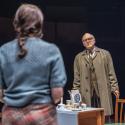

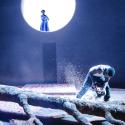
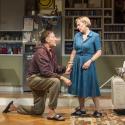
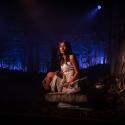






Add comment